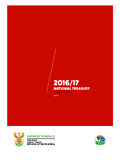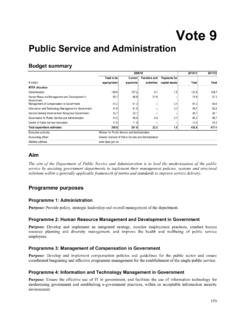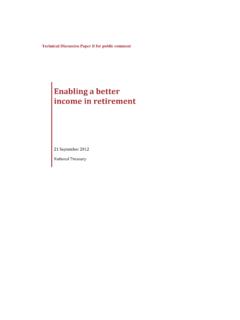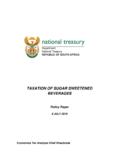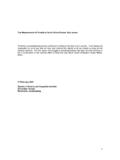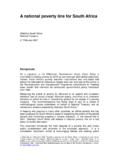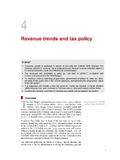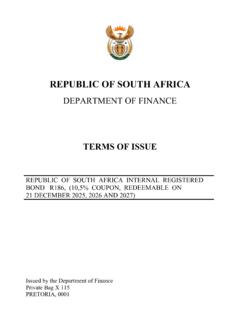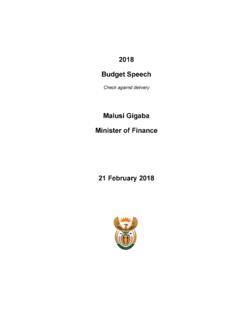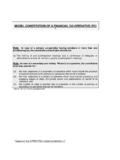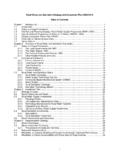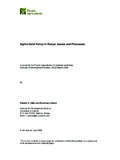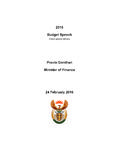Transcription of Overview of the 2007 Budget - National Treasury
1 11 Overview of the 2007 Budget South Africa s robust economy has reinforced high levels of business confidence, more rapid job creation and strong demand. Gross domestic product growth is expected to average about 5 per cent over the medium term. Anticipated Budget surpluses in 2006/07 and 2007 /08 indicate both the successful turnaround of economic performance over the past 10 years and the healthy state of public finances. Reconstruction and development remain at the heart of the National agenda. Building on a sound foundation, government aims to accelerate growth, promote social development and meet basic needs. Progress in all these areas has gained momentum over the past decade. With R89,5 billion added to departmental expenditure plans over the next three years, the 2007 Budget makes proposals, for consideration by Parliament, to modernise services and government institutions, and to move towards a social security system that provides income security for all.
2 Infrastructure investment plans are outlined from public transport to schools to housing and these and other improvements to the built environment will profoundly reshape our society in the years ahead. Economic policy seeks to widen participation and employment, support increased export levels, foster small business growth and lower the cost of doing business. Moderate tax relief and a repeal of the retirement fund tax support improved household savings. By improving government savings, the fiscal stance reduces external vulnerabilities. Promoting growth, modernisation and security South Africa s pressing development challenges demand a more rapid growth rate to generate the resources and vibrancy required to further reduce poverty and create jobs. More rapid growth is within reach, and government seeks both to accelerate the pace of economic expansion and to ensure that its fruits are shared more widely.
3 Policy initiatives supporting higher rates of investment and growth will be accompanied by concerted improvements in the security and well-being of the nation. The medium-term economic outlook remains positive, supported by the public investment programme and complementary private-sector investment, benign international economic conditions and a favourable domestic environment. Government will seek to accelerate growth beyond the 6 per cent target 2007 Budget Review 2 The present economic expansion has its roots in both consistent macroeconomic and fiscal policies and favourable global conditions. Over the past decade, sound management of the public finances has created the space to step up spending in health, education, economic infrastructure and other growth-enhancing sectors.
4 Significant levels of tax relief in recent years have also increased disposable income for households, supported savings and encouraged investment. Following a period of fiscal consolidation and structural reform from 1996 to 2001, government has also invested in improving public services, renewing infrastructure and promoting human development. This lays a foundation for future economic growth, creating jobs and opportunities across a broad range of economic activities, while fundamentally improving the lives of millions of South Africans. Consolidating these gains requires concerted movement along several fronts that will promote the modernisation and further transformation of the economic and social landscape. Sustained economic growth is a necessary precondition for South Africa s continued transformation.
5 To step up growth beyond the medium-term projections, several interventions have been prioritised that underpin the accelerated and shared growth initiative (AsgiSA). These include strengthening exports, improving public sector performance, and continuing to invest in people through better education, health and training. Government will foster a climate for robust and sustained investment in productive capacity, while undoing barriers to growth embedded in the post-apartheid landscape. Government s R416 billion infrastructure programme, now well under way, is a fundamental part of the modernising impetus and has contributed to a steadily rising gross fixed capital formation ratio, now at 18,4 per cent of GDP. Investments in electricity generation and electrification, roads, commuter rail, housing, bulk infrastructure, research and development, water and sanitation, and hospitals and clinics are contributing to a new competitive economic footing and improving the lives of people in rural and urban areas.
6 Stadium upgrading and construction and improving public transport networks, in preparation for hosting a successful 2010 FIFA World Cup, form an important part of the infrastructure programme. A long-term programme to modernise key institutions and administrative services will support the growth trend. Well-managed institutions with sound governance rules in both the public and private sectors are an important pillar of the development strategy. In addition to the core elements of criminal justice, health and education, administrative departments also need to play a key role in ensuring that public service delivery is efficient and effective. Management of public finances has created space to step up spending in key areas Modernising the economy, transforming the social landscape Infrastructure investments improve competitiveness Preparations for a successful 2010 FIFA World Cup Chapter 1: Overview of the 2007 Budget 3 But strengthening disparate institutions alone will not yield the necessary synergies that arise from better coordination and planning.
7 This will require spatial reorganisation of cities, towns and neighbourhoods to fundamentally alter the dysfunctional landscape inherited from apartheid. 2007 Budget highlights The economy and fiscal stance GDP growth of 4,9 per cent for 2006, averaging about 5,1 per cent a year over the forecast period. CPIX inflation averaging 4,7 per cent over the MTEF period. A main Budget surplus of 0,3 per cent in 2006/07 and 0,6 per cent in 2007 /08, moving to deficits of 0,1 per cent in 2008/09 and 0,4 per cent in 2009/10. Real growth in National government non-interest expenditure by an annual average of 7,7 per cent over the medium term. National Budget revenue increases to R475,8 billion in 2006/07, or R9,4 billion more than expected at the time of the 2006 Medium Term Budget Policy Statement.
8 State debt service costs as a percentage of GDP fall from 3 per cent in 2006/07 to 2,1 per cent in 2009/10. Main tax proposals Net tax relief of R12,4 billion. Replacing the secondary tax on companies with a dividend tax and reducing the rate from 12,5 per cent to 10,0 per cent. Personal income tax relief for individuals amounting to R8,4 billion. Abolishing the retirement fund tax. Reducing the withholding tax on lump sum pension and provident fund payments to zero for persons earning below R43 000 per year. Increases in the excise duties on tobacco products and alcoholic beverages. Main changes to spending over the MTEF An additional R13,3 billion for the 2010 FIFA World Cup, bringing the total contribution from National government to R17,4 billion R8,4 billion for stadiums and R9 billion for transport infrastructure.
9 The provincial equitable share is increased by R24,6 billion to improve the quality and access to health, school education, welfare services and for economic services. An additional R5 billion to the local government equitable share provides further support to municipalities for the delivery of free basic services. Spending on education is allocated an additional R4,6 billion for teacher bursaries, curriculum development and an increase in higher education subsidies. R11,6 billion for housing and community development. hospitals and health facilities. R2,4 billion for industrial development, science and technology. R6,8 billion for justice and crime prevention and improved access to justice services. R4,7 billion for international relations and defence. R3,7 billion for the comprehensive HIV and Aids programme, and the revitalisation and modernisation of 2007 Budget Review 4 Public service delivery also requires investments in information technology and aligning business processes to client needs.
10 Systems improvements are particularly relevant in the criminal justice environment, where an excessive reliance on paper flow hinders efficient administration of justice. Similarly, a revamp of information technology systems in central administrative departments will hasten service delivery. Enhanced procurement systems can substantially improve delivery throughout the public sector, especially in the context of the major public enterprises capital programmes. Reorganising and revitalising South Africa s cities will help to modernise the economy and improve security for all citizens. Urban regeneration is a long-term project. It involves integrating and extending the public transport networks, creating safe and vibrant neighbourhoods, upgrading informal settlements and developing a greater range of affordable housing options.
